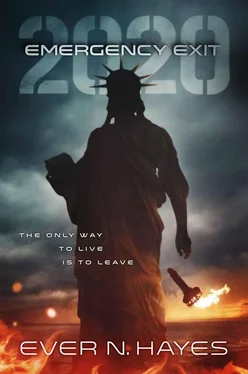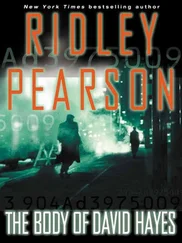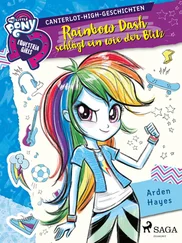We pulled the trucks through the huge front doors of the Gold Rush Casino directly into the main lobby. We searched the manager’s office and found the combination for the vault. Given its enormous size, we were able to pull the trucks directly into the vault as well. (This was the perfect opportunity for a “better safe than sorry” line, but I held my tongue.) We unloaded the millions in bills now worth more as toilet paper, and set it up to burn once we saw the first troops. Danny, Cameron, and Wes headed out around the town to start fires in the main buildings lining the major streets. They started them on the top floors so the fire would burn down slower, and we parked and torched cars on as many side streets as possible to direct passing troops on through. We waited to set the casino fire until Cameron came racing into town from the north, informing us a ton of troops were coming from Spearfish. We set the money and furniture in the lobby on fire, and crammed into the vault together. We hid as the casino burnt down around us, causing a chain reaction fire down both sides of the street. These fires, as intended, burnt much more quickly. As the troops came through town, it was pretty obvious there was nothing left to find here, so they kept moving. The drones had passed overhead a few times as well, but the fires gave them no reason to bomb the town and largely blotted out our thermal existence. It was a brilliant plan in concept, and as we headed south out of town shortly after noon, we knew it would be equally brilliant in reality, if no one were looking for us behind them.
The risk in this plan, of course, was the chance we’d be wrong, that someone would figure it out and we’d get caught in the middle of a ton of enemy troops. Given that they could likely communicate with the drones and with each other via radio, we knew that would mean the end for us.
We followed the troops all the way down to Hill City, and then Tara guided us through the back roads to her farm in the canyon behind Horse Thief Lake, two and a half miles from Mount Rushmore. We had never intended to go all the way there, but none of us would have settled for anything less at this point. Tara and Emily wouldn’t be safe traveling on their own. They’d never make it. Besides, I was still hoping she’d change her mind and stay with us. Of course, I wasn’t going to say that aloud.
If her husband wasn’t there though, we all asserted that we couldn’t just leave her. She had to come with us then. Strangely that seemed to make her even more uncomfortable. I couldn’t understand why she wouldn’t want to stay with us at that point, and clearly Danny couldn’t either. Tara said, “That wasn’t it” but that didn’t answer the question for me. So what was it then? Why not stay with us?
Outside of Hayley, Cameron, and Kate, Danny didn’t trust people much, and there was something about Tara I knew had gained his attention, something he wasn’t quite comfortable with. But he’d never say a word until he was certain, in any case, so for right now he just watched.
TWENTY-SEVEN: (Ryan) “Death is Taxing”
Danny was named after his grandfather. Obviously. Their full names are the same, although my Daniel James has gone by Danny since birth. As our firstborn, he was our pride and joy.
He’d tell you he was our guinea pig, as first children tend to be. Parents learn how and how not to parent through their first child. We’re all amateurs then, especially us guys. Okay, especially me. For instance, I’ve learned Halloween candy should not be stored in a child’s bedroom, or in the backseat with an unsupervised child on a long car ride. Mountain Dew, as much as it might work to calm down Sophie, never calmed a five year old. Slingshots in the house near the big-screen TV are a terrible idea. Even the Nerf ones. Grandparents are always eager to dole out advice, buy awful clothes, give disapproving looks when you allow something they never would have, and, as soon as you’re gone, question whether you have any idea what you’re doing. No, we don’t . But as a parent, ultimately, your children are yours, and for better or worse, they are stuck with you.
Danny was an easy baby. While he never seemed to sleep, he also never seemed to cry. He was the spitting image of Sophie, and the two of them had a bond he and I never were able to replicate. But Sophie would have told you he idolized me, and I could do no wrong by him until, of course, I did. Eight years after Hayley was born, when Danny was ten, we had another child, a boy named Logan. Logan died in his sleep of a form of SIDS days before his second birthday. It was our greatest loss as parents, and neither of us handled it well. Sophie went into a shell and since I wasn’t home when it happened I blamed her for not saving Logan. How could she have let this happen? Like it was in any way her choice . I insisted she had to have done something wrong. Daily fights and blame games gradually became weekly ones as I withdrew more and more from the home, from the kids, and from Sophie. In a screaming fight a year after he died, she broke down completely. She admitted the night he died she’d had a few glasses of wine and fell asleep on the couch downstairs with the monitor upstairs in our bedroom. He could have cried, and she’d have never heard him. She blamed herself for his death. “Does that make you feel better?” she’d screamed.
I should have been the bigger man then. I should have recognized her cry for help. I should have gone to her. I should have shared the world of hurt on her shoulders. Instead, I screamed back at her. Instead, I slammed the door and left her on the floor pleading for forgiveness. Instead, I ran away.
I didn’t see the little boy sitting on the stairs in tears, listening to every word.
I abandoned both of them—all of them. My form of grieving was to bury myself in my architecture business and to avoid contact with my entire family—even my kids. They didn’t understand. I stayed away for weeks at a time, sleeping in my downtown Rochester office. Danny was twelve at the time of his baby brother’s death, but we never saw how much of a loss it was for him, too. At least I know I didn’t. Sophie and I were bitter with each other for years. I criticized her for every failure. She would fight back because she was tired of carrying all the blame herself. She saw a counselor for several years. She needed someone who would actually listen to her. Someone who would help her parent her other two kids while her husband was off nursing his own guilt.
Finally, several months before her death, we began to mend the fences, began to become friends again. I’d begun seeing a counselor myself, and one day he asked me to be quiet, sit, and listen—something I didn’t think counselors ever were supposed to do. He talked. He told me what he thought she must have been feeling, what she must have been going through. It was a wake-up call. Four years after Logan’s death I apologized to Sophie for the first time. Sophie being Sophie, she accepted it with no questions. She was always a much better person than me. If we were honest, we didn’t have to look that far inside to know how much we loved each other, but my years of foolishness, of bitter selfishness, had created a gap between us I should have bridged long before I did. I can’t go back, but I wish I’d known how much of an impact our emotional separation had on the kids, especially Danny. Last year I told him I had at one point filled out the paperwork for a divorce. I admitted it to him wanting to come completely clean.
It turned out he’d already known. Sophie had found the papers. She never even told me that . Danny saw her reading them, and when she put them away he took them out and read them himself. He asked Sophie if I was leaving them, and she told him I wasn’t, that I wouldn’t—I was just upset with her and we’d work it out. Some friends at school, whose parents were also divorced, told him parents always said that when they’re in denial. His dad was leaving him, they were sure of it. For a boy who had always idolized his father, that was the worst possible forecast. Even though I’d been largely absent the past few years, Danny had stubbornly held out hope I’d come back. At fifteen he finally gave up on that hope. At fifteen my only son developed an intense hatred for his dad.
Читать дальше












